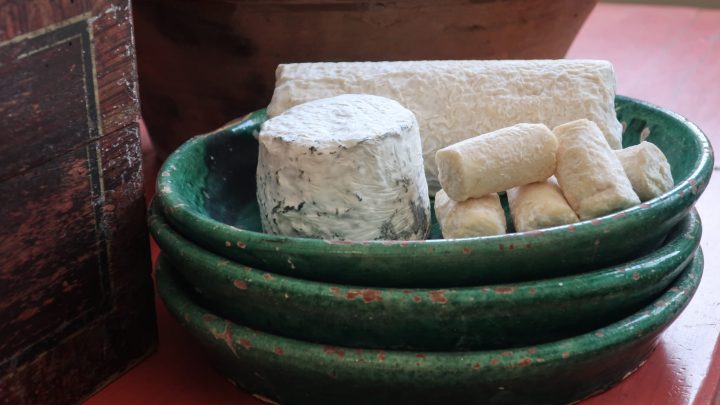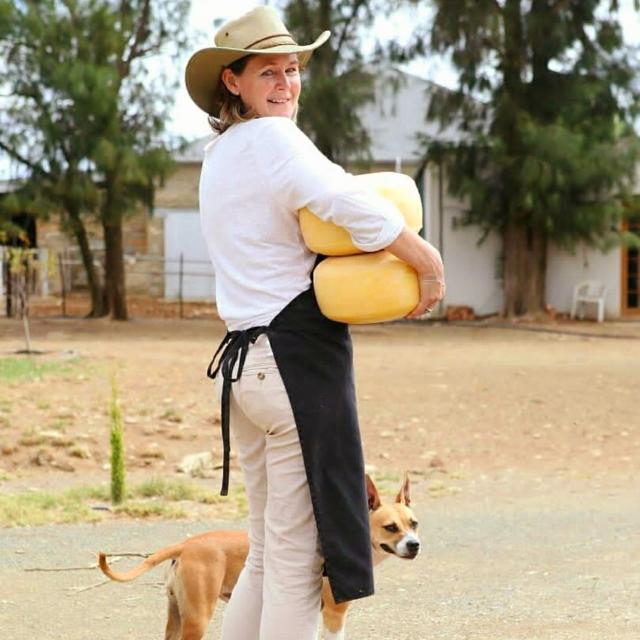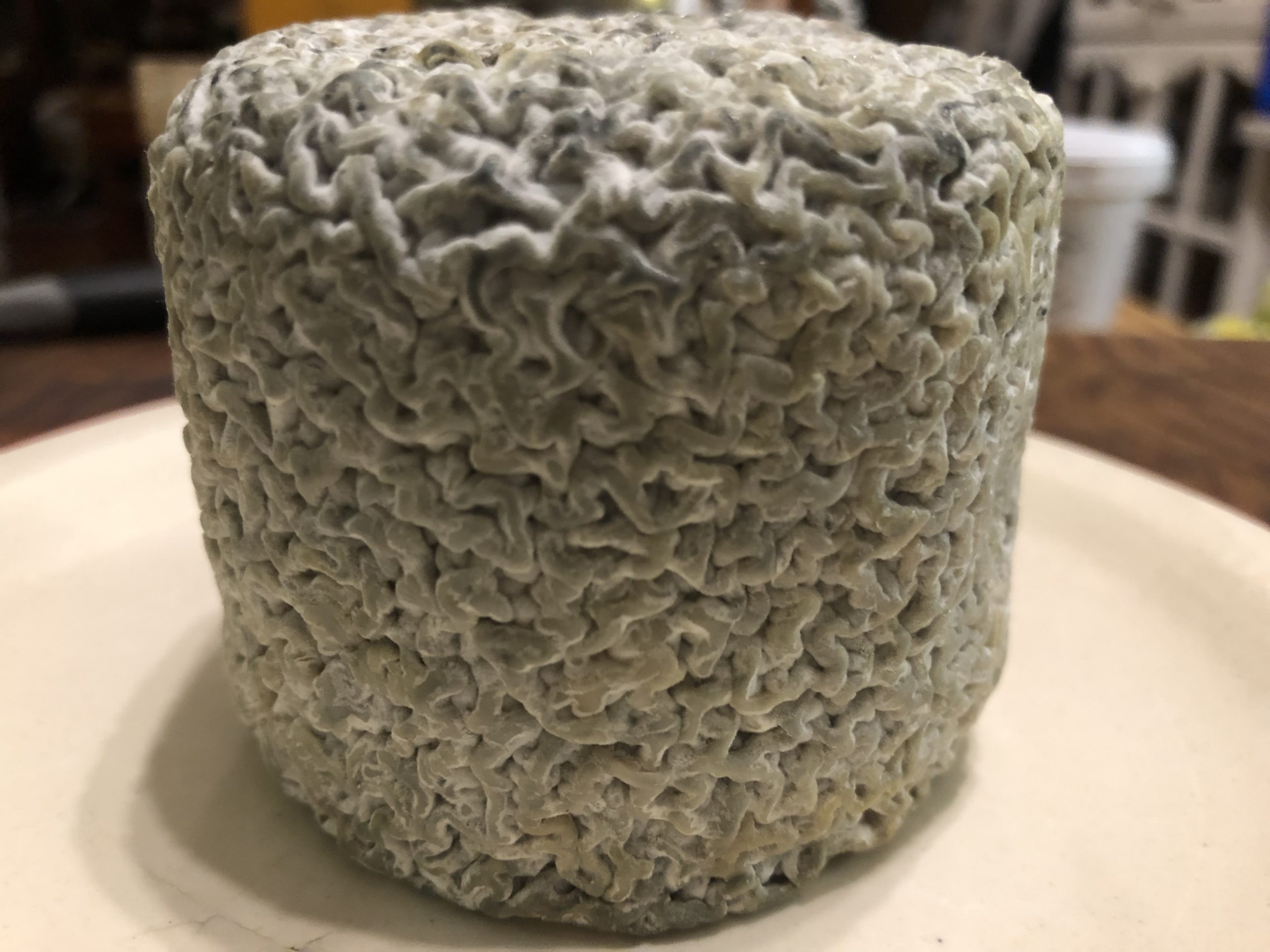WHEEL DEAL
Stalking the Cheese Whisperer and other cheeseheads

Why is so much South African factory cheese a bit clunky while our artisanal cheeses can blow you away?
I remember the first time I tasted “real” cheese. In our house cheese was a Trump-coloured block that was mainly grated over macaroni to give it some taste. We were poor. I was still at school and one day a friend and I decided to sail to Robben Island in a homemade boat with horrifying consequences, but that is another story. Once on the island beach she said, “Hey, I’ve got something.” It was a tin of Camembert, a tin. The cheese was the colour of pinchbeck and it tasted furtive, as sin or sex might taste.
It was only years later living in London that I would taste it again: Camembert, Brie, a cheese, the name I forget, that was like crunching caterpillars. Yep, I was a cheese eater, I loved its completeness. One slice and a piece of bread and you had a meal.
In the late ‘70s, early ‘80s good cheese had not yet arrived in London. But when I went to live in France I could find it in markets, even corner shops filled with these strange antiqued rounds, more like artefacts, seamed with dark blue, splodged with inky inroads. I used one as a doorstop for years.
Back in South Africa, I found one cheese, a buche, a soft-ripened cheese made from goat’s milk often in a log shape. I could not get enough of it and hung around delis enquiring anxiously. The label said it was made by someone called Pépé.
It had an almost architectural consistency with a soft wrinkly blooming rind like ancient skin. It tasted smooth, yet beneath the surface there lurked a sort of war chest of weapons that could hit you in the face like a cold penny, It might seem benign but wasn’t.
I looked for it in shops as you might seek out a special obsession, like old rose-cut diamonds. I stalked Pépé. I imagined him as a very old man with a hump.
And then through a series of coincidences I met the elusive Pépé, known as The Cheese Whisperer, a man called Gerald Tanesse, better known as Pépé Charlot, a Frenchman with all the tribal markings who has lived in South Africa for 27 years.

Pépé Charlot, aka Gerald Tanesse, aka The Cheese Whisperer. (Photo: Supplied)
He turned out to be loquacious and engaging, full of curiosity, far from old, generous hearted and obsessed by the fugitive intricacies of cheesemaking. Pépé could turn the most serious dairy-phobic into a cheese aficionado. His head is full of plans for cheese festivals, cheese talks, cheese get-togethers. Cheese is his life.
He is a disciple of raw milk.
“You cannot make good cheese with pasteurised milk,” he repeats with Gallic drama.
In fact, when the French government in the early ‘90s mooted the idea of forcing cheesemakers to pasteurise milk for cheesemaking, it nearly caused a revolution in France.

A selection of Pépé Charlot’s goat milk cheeses. (Photo: Supplied)
He makes his own cheese but his expertise lies in affinage. Affinage is a French word that refers to caring for cheese as it ages. Cheese made in factories tends to be suffocated in vacuum pack bags right after it comes out of the press.
Proper decay is stealthy; it cannot happen in a day and it needs finessing.
“Brie, for example,” he says, “needs to be made in wheels, not small round packs.
“If the cheese is hard and you want it to go creamy, you have to keep it for a long time, especially if it is made from pasteurised milk.”
Pépé made cheese come alive for me. I began to view it as a living creature, an ally, a friend, never simply as something sitting on a shelf.
In an artisanal cheese everything counts, the paper it is wrapped in (Pépé’s comes in plain greaseproof), proper turning during storage. “It all boils down to costs, it is expensive to make small amounts which is why you don’t find it in supermarkets.”
He drives every week from his home in Kommetjie to a goat farm in Lambert’s Bay where the basic cheese is made.
There are enough artisanal cheesemakers in the Cape to send you right off your chump.
They flash up from swamps, thickets, savannah lands, mountain valleys. They often start in their own kitchens with nothing more than a large pot.
David Malan of Kokerboom Kaas in Velddrif on the West Coast makes the seductive White Steenbras Camembert (all his cheeses are named after birds or fish) and is still amazed at his success. “We just had a 15kg pot and I started making it in the kitchen. Then I took it to the market and we sold out within three hours.”
In my short rather dithery cheese research I came across two cheeses that punch well above their weight.
The best taste came from Langbaken in the Northern Cape where Peter and Francy Schoeman make a Camembert called Karoo Sunset, a small washed rind-pungent cheese that with its bees wing delicacy and skeins of lushness seems to capture nature. It is as graceful as a blade of grass. As Pépé said, “They make a Camembert to die for.”

Francy Schoeman. (Photo: Supplied)
Francy shares my view that the best cheeses are made using animal rennet (many cheesemakers these days use non animal microbial rennet) and raw milk. “The quality of raw milk is crucial. We only have 12 cows and chose a Jersey herd because their milk is creamier and higher in butterfat. Because I use unpasteurised milk no two batches of cheese ever taste exactly the same.
“I am not a scientist. I work a lot on instinct. Of course there are flops but we are very fortunate with our cows. We have wonderful grass here, bright green because of borehole water.”
I am reminded of a friend, a Sudanese herdsman, who visited me in London. I took him to Hyde Park and he could not get over the lush green grass. “It is the best pasturage I have ever seen,” he said. Artisanal cheesemakers also tend to look at your green lawn and think, yep, I could bring my cows here.
The other cheese that was volcanic on my taste buds is the Nguni Camembert with Black Ash made by Stonehouse, beautiful in itself with its old toll house dating back to 1772. They have 500 Jersey cows on two separate farms. “What we want to do is to produce magnificent white mould cheese, plain but with subtle flavours arising from the environment.”

An Ash Crotin. Traditionally cheesemakers would coat cheese with a layer of ash to stop it from spoiling. Now it is added as a feature. (Photo: Supplied)
South Africa has travelled a rocky road since the introduction of dairy control legislation in 1918 which meant that all milk had to be handed to the state by the farmer and if they wanted to make cheese (only Cheddar and Gouda passed the stringent tests) they had to buy back the milk at a controlled price. Most of them didn’t bother.
Supermarket cheese can be excellent and they are much cheaper and what most of us grew up on. The problem is that people who have eaten artisan cheese find it difficult to get used to cheese made from pasteurised milk and often packed with preservatives and then vacuum packed.
Dalewood are interesting cheesemakers because they have managed to close the aisle that divides artisanal and commercial cheeses with a product that is affordable, available in select supermarkets and meets all artisanal requirements.
I spoke to Petrina Visser, owner and marketing manager of Dalewood. “We are 100% artisanal. We don’t buy in any milk. We use our own Jersey milk to make estate cheese and our cheese is handcrafted.”
In its distinctive gold wrappers, the Dalewood award-winning white mould cheeses (Brie, Camembert and Blue) have a creaminess known all over the world. My sister in Oxford always says, “Don’t forget to bring some Dalewood cheese.”
“What we have seen in the last eight months with Covid-19 is that people are interested in the provenance of their food and we really love that because it totally fits with our traditional cheese making.”
Their Wineland range is unique, a style of cheese that does not require ripening. “Because of our eco friendly approach to farming we are able to produce a natural product with no preservatives, colourants or flavourants.”
Once resisting a supermarket cheese a friend who was with me, French, and who had squeezed every cheese on the shelf, said, “Just let it ripen in a cupboard, it will be perfect.” But it wasn’t perfect, it turned from solid to bad, nothing like the Brie de Meaux I sometimes treat myself to, R170 for a thin slice, from The French Market in the Gardens Centre.
Jane Selander, who works the Oranjezicht market and is Miss Cheese of Cape Town, says that foreigners complain that they can’t eat our supermarket cheeses. “They just gobble up anything I sell at the Oranjezicht market.” Jane sells a selection of artisanal cheeses. It was here that I first tasted Gay’s cheese from her Guernsey Dairy in Prince Albert and although it covered all my requirements (animal rennet, raw milk) it lacked personality. I am sorry to say, it was the cheese equivalent of the pub bore.
If you are lucky enough to find an artisanal cheese, buy it. Cheese is the new wine. DM/TGIFood
The Cheese Whisperer: Gerald Tanesse – aka Pépé Charlot – 083 333 9418.





 Become an Insider
Become an Insider
What a delicious and interesting read. Bring on the bread and cheese… Yum.
That factory cheese may be a tradition in South Africa. My question, however is why does the cheese selection in supermarkets hardly change over time? What we find is mostly cheese imported from France and Switzerland, why is there hardly any from local producers? Even Fairview seems to have vanished from the shelves. I have tried to buy decent cheese here for 15 years, and to this day I still drive all the way out to Dalewood.